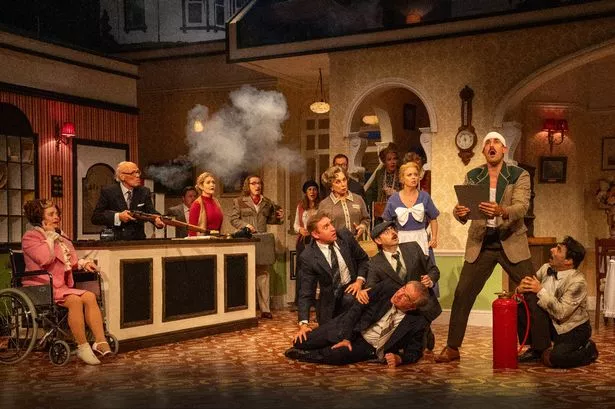
Legendary Comedy Characters in Classical Theatre
Upstartcrowthecomedy – In the dim glow of candlelit stages centuries ago, audiences roared with laughter at fools, lovers, tricksters, and witty servants who shaped the heart of theatrical humor. Even today, those performances echo in modern sitcoms, improv shows, and Broadway musicals. Through timeless personalities, classical theatre built the DNA of humor we still recognize foolish nobles, mischievous servants, earnest lovers, and comically flawed heroes. These Legendary Comedy characters survive across eras not because they belonged to the past, but because they understood what it means to be human. They embodied our pride, our foolishness, our desires, and our hilarious inability to escape life’s chaos. That universal connection keeps Legendary Comedy figures alive in culture and creativity.
From Shakespeare’s lively jesters to the masked eccentrics of Italian Commedia dell’Arte, each persona lived larger than life. Moreover, they offered audiences a mirror where absurdity meets truth. After all, humor reflects society, and laughter often reveals more than silence. As we explore these characters in detail, the goal is not to simply admire them, but to understand why these Legendary Comedy creations continue to inspire new storytellers. Surprisingly, modern theatre, films, and streaming shows still borrow archetypes built long before electricity existed. The question, therefore, is simple: what makes these personalities eternal? The answer lies in their structure, flaws, and emotional honesty.
To guide your journey through the traditions of Legendary Comedy, we break down iconic roles, how they evolved, and why they continue to influence scripts today. This exploration also opens space for creative reflection. Whether you are a theatre enthusiast, writer, comedian, or curious observer, the history of Legendary Comedy characters offers you an endless source of insight — and perhaps, inspiration for your own stories.
Read More : Can AI Replace Literary Reporters? Expert Insights
Harlequin is among the most vivid Legendary Comedy figures from Commedia dell’Arte, instantly recognizable with acrobatic movements and diamond-pattern costumes. This playful trickster thrives on witty improvisation, clever pranks, and chaotic loyalty. Because Harlequin serves both chaos and charm, he pulls audiences into unpredictable stories. Theatre historians often praise him for pioneering physical humor, which explains why slapstick comedians still echo his movements.
Pantalone embodies everything that Legendary Comedy used to critique in wealthy social classes. In classical theatre, he served as a miserly old merchant obsessed with money and status. That obsession made him vulnerable to ridiculous outcomes, often mocked by clever servants. Through Pantalone, Legendary Comedy exposed greed and social arrogance while delivering belly laughs rooted in satire.
Unlike simple jesters, Shakespeare’s Fool wielded intelligence with mischief, revealing truth through riddles and comedy. This character symbolizes how Legendary Comedy uses humor to challenge authority. As a result, audiences admired the Fool not for foolishness but for bravery and insight. Surprisingly, many fans still quote the Fool’s lines as philosophical wisdom disguised in playful tone.
In classical Commedia plays, Colombina serves as a lighthearted yet brilliant character. She solved problems, manipulated egos, and protected her own heart while others fell apart. As an essential presence in Legendary Comedy, she represented the power of intuition and female intelligence long before equality became a universal conversation. Her quick thinking and realism influenced modern romantic comedy heroines.
Sir John Falstaff remains a towering figure in Shakespeare’s comic world. With wit, mischief, and flawed morality, he represents indulgence and charm. While not noble in behavior, Falstaff’s exaggerated personality shaped Legendary Comedy by combining humor with flawed humanity. Many critics argue he became the blueprint for modern comedic antiheroes — big personalities with messy hearts.
Arlecchino, closely tied to Harlequin traditions, strengthened the physical DNA of Legendary Comedy. Gymnastic movement, expressive gestures, and rhythmic chaos formed the foundation of slapstick and clowning. As performers trained through generations, Arlecchino’s influence can still be seen in mime theatre, circus comedy, and modern improv.
The braggart soldier archetype appears across ancient Greek plays, Roman comedy, and Renaissance theatre. Loud, arrogant, and hilariously insecure, he embodied the satirical purpose of Legendary Comedy: expose ego through laughter. Many modern comedy scripts still include the “tough talk, weak reality” trope born from this character.
Contrary to tragedy, comedic lovers in classical theatre often stumbled through misunderstandings, disguises, and playful interruptions. Their mistakes and hope-filled hearts brought warmth to Legendary Comedy narratives. As romance evolved in drama, these characters created the formula for today’s romantic comedy structure.
These figures endure because Legendary Comedy reflects universal truth through humor. Human flaws, pride, longing, and foolishness never disappear. Therefore, audiences connect emotionally while laughing openly. Classical theatre planted seeds for storytelling formulas still used in television sitcoms, Broadway musicals, and web comedy formats.
Moreover, anyone studying performance, writing scripts, or analyzing character arcs can trace modern humor to these foundational personalities. That makes Legendary Comedy characters not relics, but living teachers shaping creativity every day.
Ultimately, the beauty of Legendary Comedy lies in its timeless understanding of human nature. We laugh at these characters because we recognize ourselves in them — ambitious like Pantalone, mischievous like Harlequin, vulnerable like comedic lovers, and wise like Shakespeare’s Fool. When performed with heart, these roles do more than entertain; they remind us that humor reveals truth where seriousness fails. And as theatre continues evolving, storytellers across generations will always return to these characters not for nostalgia, but for guidance and inspiration.
This website uses cookies.